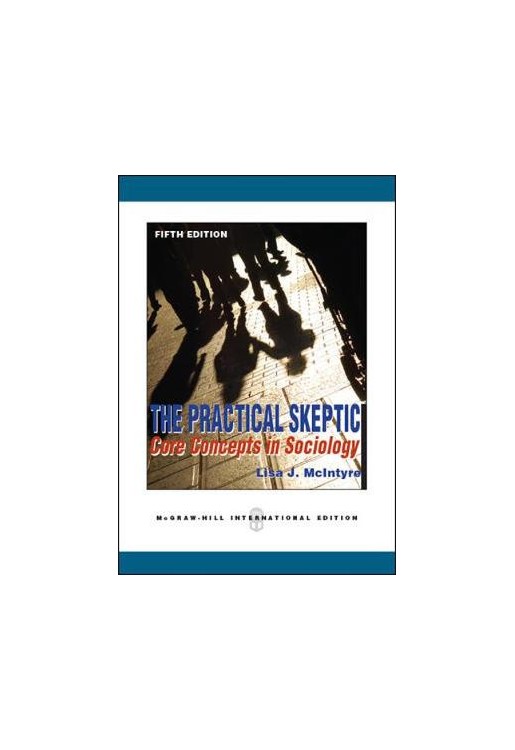The Practical Skeptic, a concise introduction to sociology, focuses on core concepts as the central building blocks for understanding sociology. Lisa McIntyre's straightforward, lively, even humorous style and her emphasis on critical thinking make this an engaging and user-friendly text for students of all levels. Through this conversational narrative students are able to grasp key sociological concepts and learn the essential lesson that there is much that goes on in the social world that escapes the sociologically untrained eye.
Preface Introduction So, What is Sociology? The Value of Sociology to StudentsTips for Studying Sociology-And An Invitation
Chapter 1: Responding to Chaos: A Brief History of Sociology Inquiries into the Physical WorldTechnology, Urbanization, and Social UpheavalThe Origins of Modern Sociology in France: Emile DurkheimExcerpt: Emile Durkheim, from Suicide (1897) and The Rules of the Sociological Method (1904)The Origins of Modern Sociology in Germany: Ferdinand Tonnies and Max WeberExcerpt: Ferdinand Tonnies, from Gemeinschaft and Gesellschaft (1887)Karl Marx The Origins of Modern Sociology in England: Herbert SpencerSociology in the United StatesBox: One small step for sociologyThe Place of Sociology in Modern Society
Chapter 2: The Sociological Eye The Focus on the SocialSkepticismBox: Nail down that distinction between manifest and latent functions
Chapter 3: Science and Fuzzy Objects: Specialization in Sociology Dividing Up the TaskTopic Area or Subject MatterTheoretical Perspectives (Paradigms): Functionalist, Conflict, and Symbolic InteractionistWhich Paradigm Is Correct?Levels of Analysis: Microsociology and Macrosociology
Chapter 4: Who's Afraid of Sociology? The Empirical World and Inconvenient FactsEthnocentrismAvoiding Ethnocentrism Can Be DifficultCultural Relativism
Chapter 5: The Vocabulary of Science VariablesHypothesesKinds of Variables: Independent Versus DependentKinds of Relationships: DirectionalityOperational DefinitionsTables and Figures
Chapter 6: Doing Social Research Two Traditions: Quantitative and Qualitative ResearchFirst Things First: The Lit ReviewThe SurveyBox: Six guidelines for crafting survey-questionsThe ExperimentBox: Five rules of doing true experimentsObservationUnobtrusive (Nonreactive) ResearchThe Importance of TriangulationSamplingBox: Ethics and social research
Chapter 7: Culture Material and Nonmaterial CultureBox: The power of informal sanctionsBox: What do Americans value?Box: IdeologyBox: PonderBox: Statements of BeliefHow It Adds UpCulture as a Product of ActionCulture as a Conditioning Element of Further ActionBox: Varieties of cultural wisdomSocial Institutions Social Change: Cultural Diffusion and LevelingSubcultures and CounterculturesIdioculturesExcerpt: Margaret Visser, from Much Depends upon Dinner (1986)
Chapter 8: Social Structure StatusesRolesBox: Tricky tricky situationsMaster StatusGroups
Chapter 9: Society and Social Institutions Societal NeedsThe Nature of Social InstitutionsBox: Polygamy and monogamySocial Change: The Trend Toward Increasing Specialization
Chapter 10: Socialization Nature and Nurture: Biological and Social Processes How Socialization WorksExcerpt: George Herbert Mead, From Play and Games in the Genesis of Self (1934)Box: Rites of passageResocialization and Total InstitutionsPonder
Chapter 11: Deviance and Social Control The Relativity of Deviance (What We Already Know)Nonsociological Theories of DevianceSociological Theories of Deviance: Emile Durkheim and SuicideMore Structural Strain: Robert Merton and AnomieLearning to Be Deviant: Howard Becker's Study of Marijuana UseThe Societal Reaction Perspective: Labeling TheoryThe Functions of Deviance: Maintenance of the Status Quo and Social ChangeBox: Ponder
Chapter 12: Stratification and Inequality Caste SystemsEstate SystemsBox: A year in the life of the peasantClass SystemsTheoretical Conceptions of ClassBox: PonderSome Words About SlaverySocial Mobility and Open Versus Closed Systems
Chapter 13: Inequality and Achievement: Social Class Box: The Mathew effectExplaining Social StratificationBox: Beyond academicsThe Pygmalion Effect: The Power of ExpectationsThe Fallacy of Hard WorkSocial Mobility, Social Structure, and Social Change
Chapter 14: Inequality and Ascription: Race, Ethnicity, and Gender Why a Dollar Is Not Always a DollarPrejudiceDiscriminationDiscrimination and "Isms" The Social Construction of Minority GroupsGenderBox: Sex or gender?
References Glossary/Index Credits
Each chapter ends with End of Chapter Review and Stop and Review: Answers and Discussion


